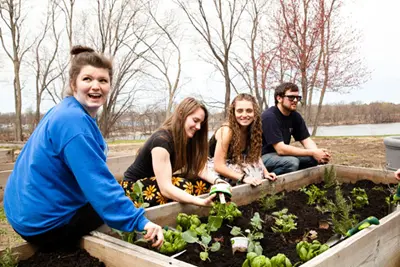Push is on for More Locally Grown and Sourced Ingredients
 Image by Ed Brennen
Image by Ed Brennen
04/28/2016
By Ed Brennen
The bruschetta flatbread was topped with fresh tomatoes from Backyard Farms in Madison, Maine, and served on flatbread from La Ronga Bakery in Somerville. The baked pollock was caught off the shores of Chatham. And the roasted red potatoes with lemon thyme were pulled from the ground at Ferolbink Farm in Tiverton, R.I.
To highlight its commitment to sustainability, (http://umasslowell.campusdish.com/) University Dining once again crafted a “Farm to Table” menu on Earth Day (April 22), providing a bounty of locally grown and locally sourced products in dining halls across campus.
While many of the university’s everyday menu items already come from local partners (such as dairy from Shaw Farms in Dracut and bagels from Perfecto’s in Andover), the bi-annual Farm to Table meals serve as a reminder that food sourced from right here in New England not only has environmental and economic benefits, but usually just tastes better.
“Everyone likes to know where their food is coming from, and we always try to promote what’s local,” says Rachel DiGregorio, marketing manager for University Dining, which is managed by Aramark. “But when an entire menu is dedicated to that, that recognition goes a long way.”
 Image by Ed Brennen
Image by Ed Brennen
Students can expect to see even more local ingredients on their plates in the near future thanks to University Dining’s new contract with FarmLogix, a national technology platform that connects local farmers to large institutional kitchens. According to Bruce Perry, district manager for University Dining, FarmLogix will be helpful in identifying local sources that can handle the university’s high demand for popular products such as ground beef, chicken, French fries and mozzarella cheese.
“If we can get four or five of these big, sustainable, local products, that will really move the needle for us on our purchasing number,” says Perry, who estimates that 12 percent of menu items are currently from local vendors.
University Dining provides approximately 45,000 meals each week at dining halls and retails locations across campus, as well as thousands of other meals through catering and Tsongas Center events.
Executive chef Frank Hurley, who works with both local and national vendors on a weekly basis to find the freshest, in-season ingredients, tries to keep his shopping list to within a 250-mile radius of campus.
“If one apple is from 280 miles away, and another one is from 110 miles away, we’re going with the closer one,” he says. “It may be a little more expensive, but the less it has to be shipped, which saves fuel, the better.”
Another menu change being made this spring is a switch to sustainable tuna, which is caught with fishing lines instead of nets, thereby reducing harm to other types of fish.
 Image by Ed Brennen
Image by Ed Brennen
“It’s basically a lot better product across the board, from the way it’s caught to the way it’s canned and processed,” Hurley says. “It’s not harming any other fish in the whole process.”
One other way University Dining is focusing on sustainability — but which actually has very little to do with food — is by getting South Campus Dining in the recently renovated McGauvran Center certified as the university’s first “Green Restaurant” by the Green Restaurant Association.
The GRA rates food service operations with points in seven environmental categories: water efficiency, waste reduction and recycling, sustainable furnishings and building materials, energy, disposables, chemical and pollution reduction — and sustainable food.
“That will probably happen over the summer. We’re real close to finalizing it,” says Aaron Bennos, director of operations for University Dining.
“Sustainability really is a multifaceted educational process,” DiGregorio adds. “It’s not just food. It really is a campus initiative, from the supplier to the end user.”




